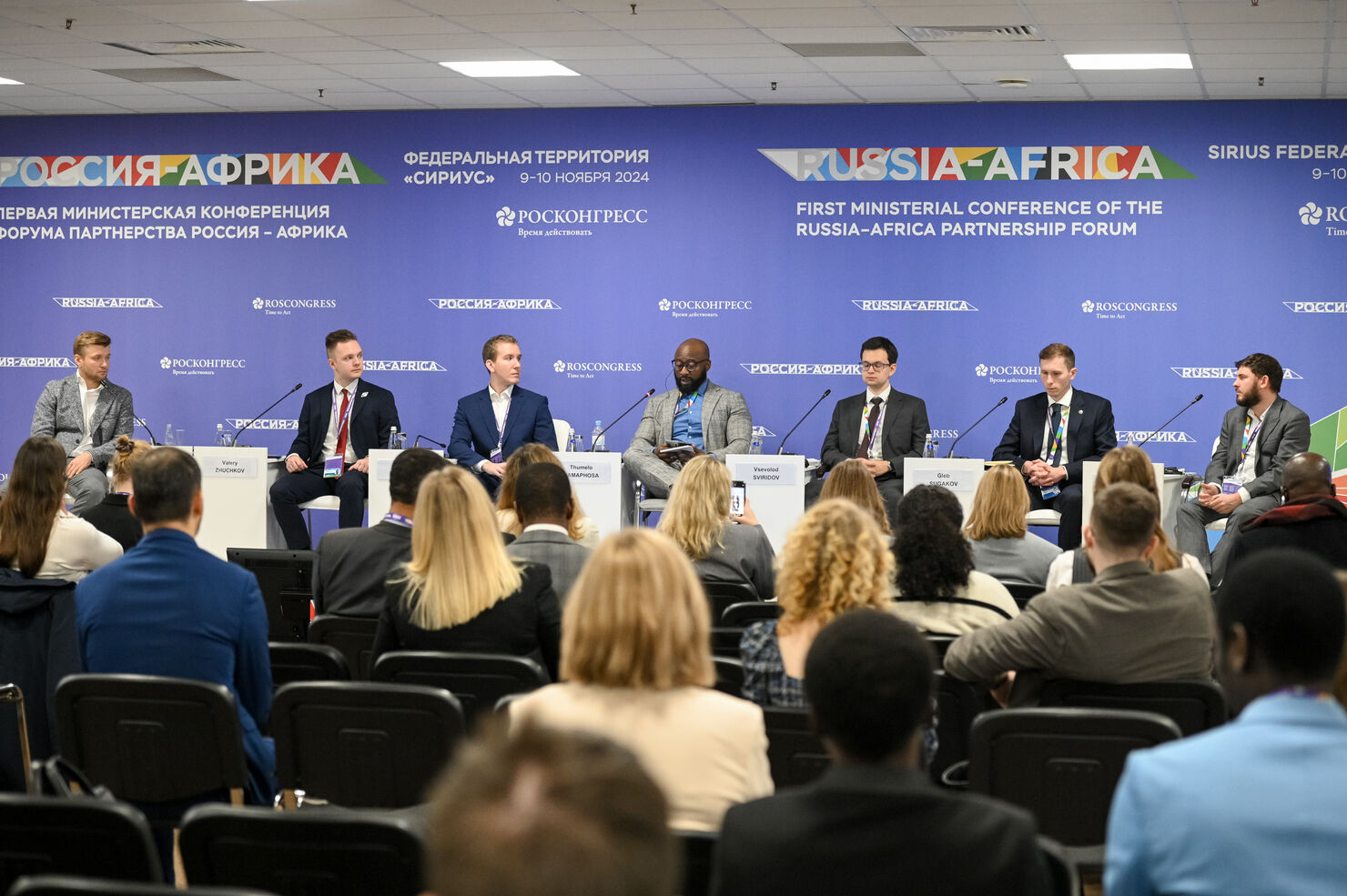
On November 9, as part of the First Ministerial Conference of the Russia-Africa Partnership Forum, the “Youth of Russia and Africa: Looking into the Future” session was held. The event was organized by the World Youth Festival Directorate and Moscow State Institute of International Relations of the Ministry of Foreign Affairs of the Russian Federation (MGIMO).
The session was moderated by Daniil Bisslinger, Advisor on International Affairs to the Head of Rosmolodezh, Director General of the World Youth Festival Directorate. He noted that holding the Russia-Africa Forum and the First Ministerial Conference is an important indicator of the fact that cooperation with the continent is being intensified.
"As part of the forums, we talk about joint projects between Russia and Africa, initiatives that are put forward by our partners, new trade routes, promising endeavors. We look to jointly fill the polycentric world with new meanings and standards. Thanks to the World Youth Festival, the instructions of the President of Russia and the “Russia in the World” federal project, it is now possible to systematically pay attention to our foreign partners, invite them to international events and build mechanisms of interaction," saidDaniil Bisslinger.
During the discussion, foreign and Russian experts talked about the development of Africa in recent decades, its increased role in the international arena and multilateral cooperation between young people from the continent and Russia.
Tumelo Ramaphosa, CEO of Studex Group from South Africa, spoke about the most promising areas of cooperation between the countries. Among them, he highlighted e-commerce, education and communication, development of the women's movement, energy and agriculture.
"Modern youth opens up unique opportunities for interaction between Russia and South Africa. For example, young people are ready to take an active part in educational and economic programmes – they will help our students acquire the necessary skills. I am sure that with Russia's help our projects will be successful and we will be able to bring the necessary technologies to the African continent to strengthen its role in the international arena," said Tumelo Ramaphosa.
Deputy Executive Secretary of the Programme Committee of the Youth Forum “Russia-Africa: What's Next?”, analyst at MGIMO Valery Zhuchkov spoke about three key projects of the university aimed at strengthening Russia-Africa relations. According to him, the ideas to create the Anti-Fake Agency, the Foundation for Educational Initiatives and the Center for Projects in Economics, Culture, Politics and Other Spheres were put forward at the forum.
"Russians and Africans are very similar. We strive for equality, justice, multipolar world and we do not accept interference in our internal politics. It is also important to keep in mind that Africa is not a single entity, on the contrary, it is a multitude of countries and cultures. Similarly, Russia is comprised of different peoples and traditions. Therefore, it is very important to build relations in the line of interregional horizontal cooperation,” Valery Zhuchkov added.
Alexander Kormishin, Director of the Center for International Partnerships of the Corporate Academy of Rosatom, presented projects in the field of energy cooperation with African countries. Deputy Director of the Center for African Studies at the National Research University Higher School of Economics Vsevolod Sviridov spoke about the training of African students and the increased demand for African studies in the scientific field.
Gleb Sugakov, researcher and Co-chair of the Council of Young Scientists of the Institute of African Studies of the Russian Academy of Sciences, noted the importance of educational exchanges and cooperation in the scientific field. He also added that it is the young generation, who the preservation of the cultural code of the peoples of Russia and Africa depends on.
During his speech, Christopher Douglas Emms, representative of Great Britain, Head of the Brokerage Department at LM Investments, said that the Russian model of interaction with Africa is different from the Western one because it is based on the principles of constructive cooperation, friendship and hospitality. The entrepreneur also believes that our country is conducting successful business projects in the continent.
The discussion and speeches given by experts attracted interest among the listeners. The Minister of State for National Education of the Central African Republic Aurelien Simplis Kongbele-Zingas noted the necessity of studying the Russian language in African countries:
"We would like Russia to reconsider its position in the field of educational cooperation and send specialists to African countries to teach young people the Russian language, Math, Chemistry, Biology and other scientific disciplines that could contribute to the development of the economy of our countries. In this case, the language barrier between us will be overcome, and this will give new momentum to the relations between our states. Therefore, we look to develop cooperation in the field of linguistic education between Russia and the African continent”.
He also outlined the idea of creating a Russian media space in Africa to broadcast content alternative to Western media.
Former Ambassador of the Republic of Benin to Russia and CIS countries Anicet Gabriel Kotchofa suggested creating a platform for communication between Russian and African experts and young people. He also noted the need to strengthen educational exchanges.
"Today we have met to lay a solid foundation for multifaceted cooperation among our countries. The Russia-Africa dialogue has been active for a very long time. Your country has been training specialists for this continent for many years. Russia has done a lot to extend its hand to Africa. And now we still need each other: our young people need education, science, technology – the resources that Russia possesses. There are more than 30,000 African students studying at universities now, and this number needs to be increased. There are no experts on Russia in Africa, so it is necessary to start working with students now. When they return home, they will become ambassadors of Russia and promoters of international cooperation,” said Anicet Gabriel Kotchofa.
Overview:
The World Youth Festival took place on March 1–7, 2024 in Sirius, according to the Decree of Russian President Vladimir Putin on the development of international youth cooperation. The WYF-2024 brought together 20,000 young leaders from 190 countries.
On the instructions of the President of the Russian Federation, the WYF will be held in Russia on a regular basis – once in six years. Also, every six years 10,000 young people from all over the world will get together at the International Youth Festival, and in between, international themed gatherings and events will be held under the auspices of the WYF. Festival events of various formats will be held in Russia annually.
According to the instructions of the President of the Russian Federation on preservation and development of the Festival legacy, the World Youth Festival Directorate continues work aimed at strengthening international youth cooperation.
